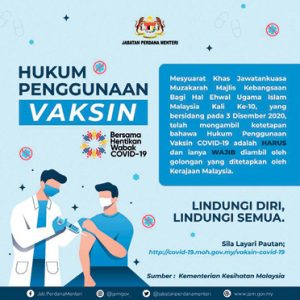In Malaysia, the vaccine has been concluded as harus (permissible) and wajib (mandatory)

Malaysia’s National Covid-19 Immunisation Programme (NIP) was going strong. It is rated as one of the nations with the highest vaccination rate in the world.
However, there are still some who are refusing to be vaccinated, mainly on religious grounds.
Director of Institute of Fatwa dan Halal (IFFAH), Prof Dr Irwan Mohd Subri, spoke with The Health regarding the refusal of Covid-19 vaccines among some in the Muslim community and the halal status of the vaccines.
Halal status of Covid-19 vaccines
Based on the Islamic faith perspective in Malaysia, the Covid-19 vaccine has been concluded as harus (permissible) and wajib (mandatory).
Dr Irwan explained that harus and wajib were two different rulings. The former gives a choice to refuse inoculation, and the latter meant inoculation was compulsory.
“When the government decides the vaccine is compulsory for certain groups, it has to be followed.”
The ruling on the Covid-19 vaccines was decided by the Muzakarah
Committee of the National Council for Islamic Affairs. The Muzakarah Committee consists of each state’s Islamic Council Muftis.
 “The committee listened to the presentation on the vaccines by the Ministry of Health (MoH) before they decided on the ruling.
“The committee listened to the presentation on the vaccines by the Ministry of Health (MoH) before they decided on the ruling.
“Once they are satisfied with the presentation and answers, the committee concludes the vaccine is permissible.
“It was decided the vaccine is wajib for those deemed necessary by the government, such as frontliners, high-risk groups, government servants and so on.”
When asked about how long the ruling will be applicable, he replied that as long as the situation is deemed as darurah (necessity), the verdict was to be followed.
A darurah situation is when either it causes death or a critical condition. And thus, Prof Dr Irwan stressed as long the virus posed a fatal danger to the populace, we were in the darurah situation.
Refusing the vaccine
Dr Irwan explained the refusal to vaccinate by some was not just confined to the Covid-19 vaccine but vaccines in general.
The discussion on vaccine rejection among the Muslim community has been active since 10-15 years back.
The doubts about the vaccine is not just about the vaccines containing prohibited materials in Islam. There were other claims that vaccine can cause autism and unwanted side effects, etc.
“It has been a challenge for the MoH, State Mufti offices and the Muzakarah Committee to convince those who reject vaccines on religious grounds.”
Dr Irwan is no stranger to educating the public on vaccination as he is involved with the Health Education Seminar programme organised by the MoH.
“I have been a regular panellist since 2014. The programme tackles smoking, abortion, and vaccination issues. Each issue is assigned to two people, one with a medical background and a shariah background.
“So, as the Shariah expert panellist, I was assigned to shed light on the Islamic teaching and perspective on vaccines to the Muslim community. This is to encourage them to get themselves vaccinated and protected from diseases.”
It is undeniable that the anti-vaccine movement is gaining traction with social media and message chain apps.
“Nowadays, we can see netizens believing all kinds of information that to them seem logical regardless of the source and its credibility.
“There are some who refer to published journals and articles. However, if we check the sources, it has been either rejected or debunked by experts.
“From my experience and observation of the anti-vaccine movement, they are more focused on the safety and the effectiveness of the vaccine, and they rarely touch on the faith perspective.
“While there are some doubts on religious grounds, it is never the key argument for the anti-vaccine movement.”
IFFAH merger
IFFAH was the result of a merger between two different Centres of Excellence of USIM, the Institut Pengurusan dan Penyelidikan Fatwa Sedunia and Institute of Halal and Business Management.
Services at IFFAH include research, consultation, training, publication, innovation, laboratory and shariah compliance.
“In terms of research and consultation, we serve mainly the Department of Islamic Development Malaysia (JAKIM) and Jabatan Mufti-mufti Negeri. We also provide consultation to international bodies such as pharmaceutical companies.
“We provide training for both fatwa and halal. We also have the Professional Halal Executive Programme, which is certified by JAKIM.
“Once you have passed this certification, you will be able to become a halal executive in a company in Malaysia or at an international level.
“We have won several competitions for innovation. We have developed educational games for halal, zakat, teaching the Arabic language and so on.” — The Health







